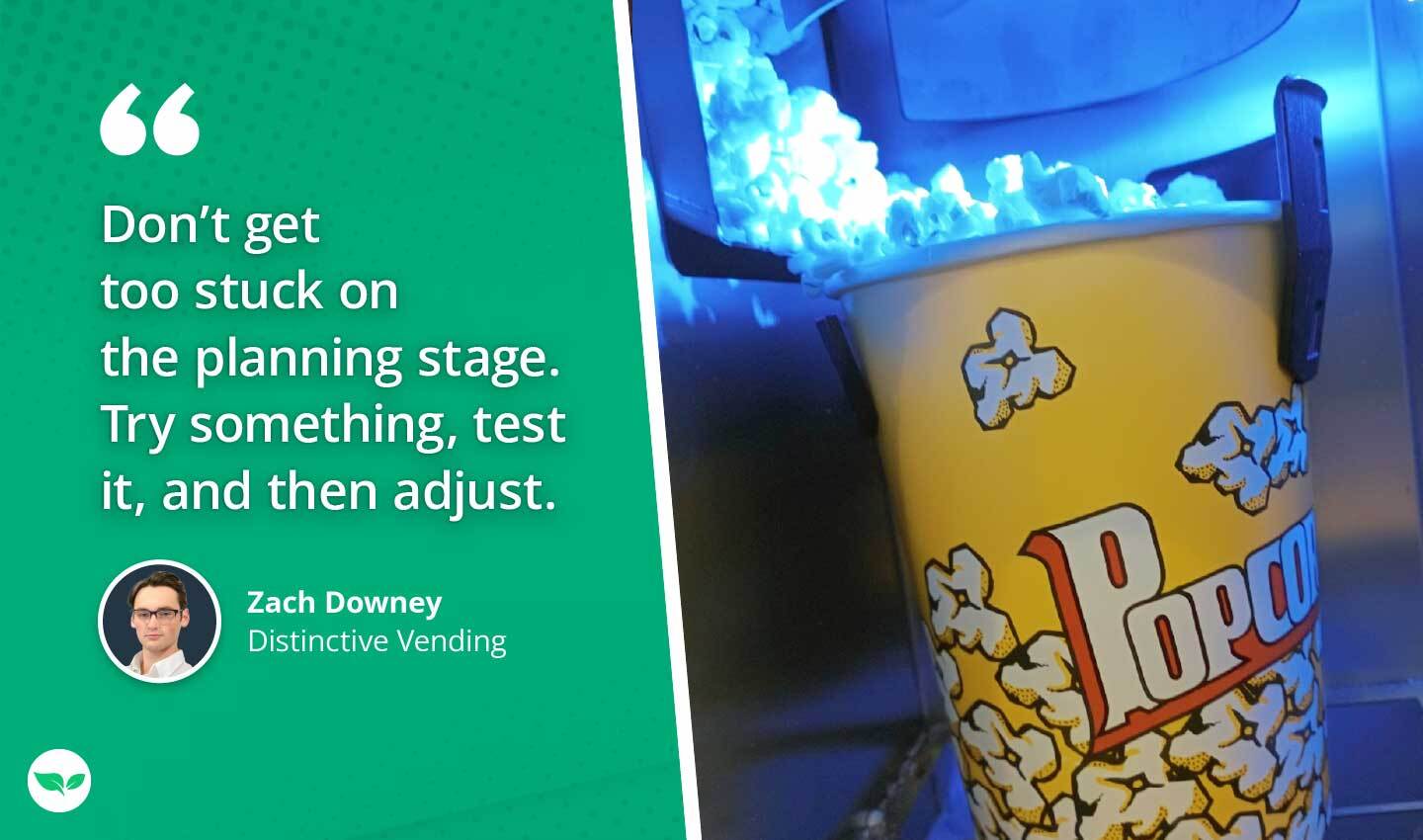How This College Student Built a $500K Vending Machine Business
See how Zach Downey built a $500K cotton candy vending business, overcoming challenges and finding top locations to keep profits rolling.
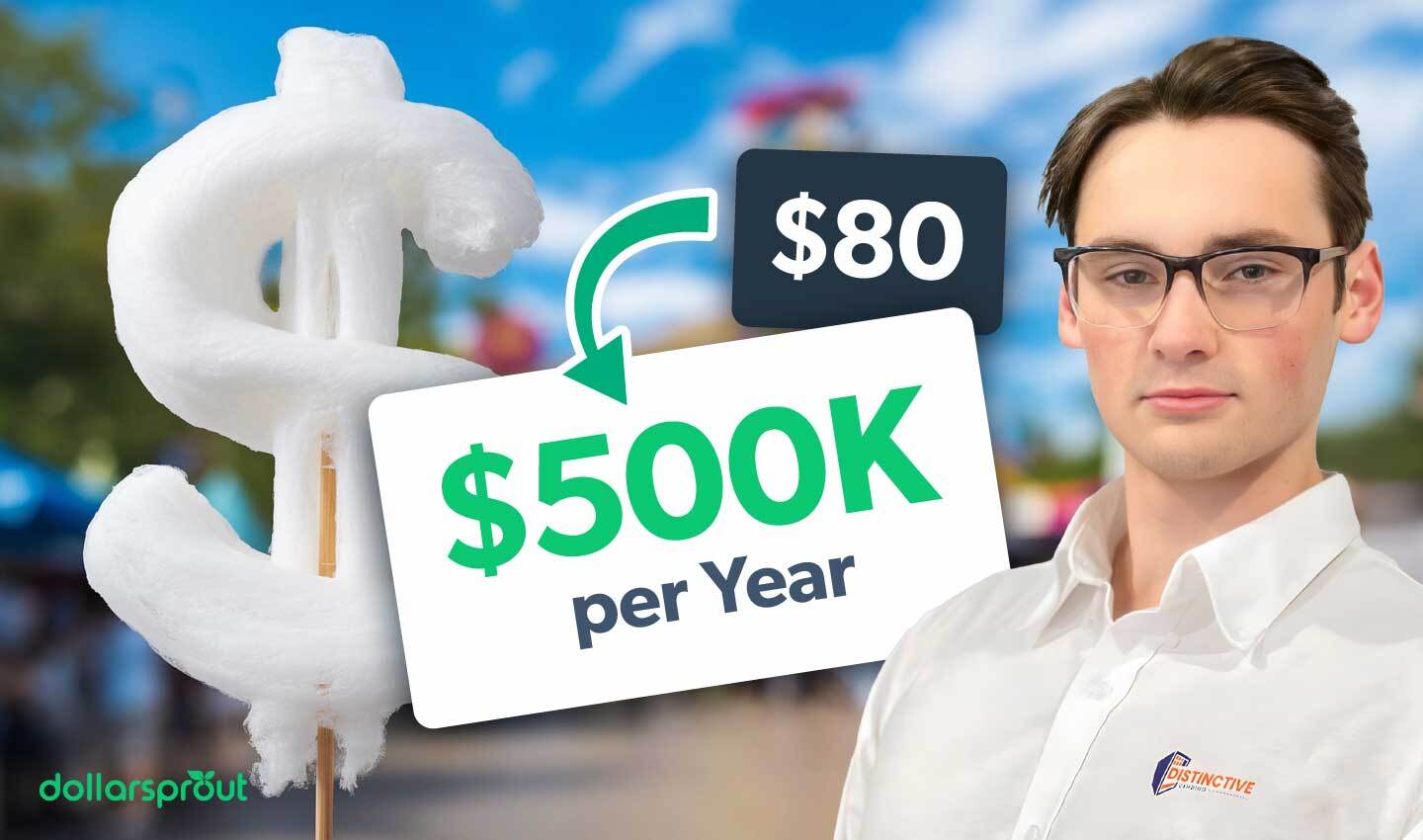
At just 22 years old, Zach Downey has built a six-figure business from an unlikely source: cotton candy vending machines. What started as a college experiment to solve late-night snack shortages at James Madison University quickly pivoted into something much sweeter. With ten machines spread across high-traffic locations like amusement parks and resorts, Zach’s business, Distinctive Vending, is projected to earn over $500,000 in revenue this year alone.
But his path to success wasn’t exactly smooth. From untested ideas to expensive mistakes, Zach’s entrepreneurial journey has been anything but typical. His early attempts at a pizza vending machine ended in regulatory roadblocks, and he endured countless 24-hour drives to troubleshoot machines stationed across the country. Through it all, he’s refined a strategy that combines unique product placement, targeted marketing, and semi-passive income — a formula that’s now positioned him to scale his business even further.
Today, Zach shares the highs and lows of his cotton candy empire, his best tips for breaking into vending, and the strategic moves that helped him transform a simple side hustle into a thriving enterprise.
Learning Through Failure
Zach Downey’s journey into entrepreneurship started long before Distinctive Vending. As early as age ten, he and his brother explored several side hustle ideas, from neighborhood lemonade, to door-to-door vacuum sales, to a power washing business. “In my opinion, the reason for our continued success was due to our high level of cooperation,” Zach explained. “In a partnership, cooperation is the lifeblood of success. You need to be able to trust each other’s judgment, especially when you disagree.”
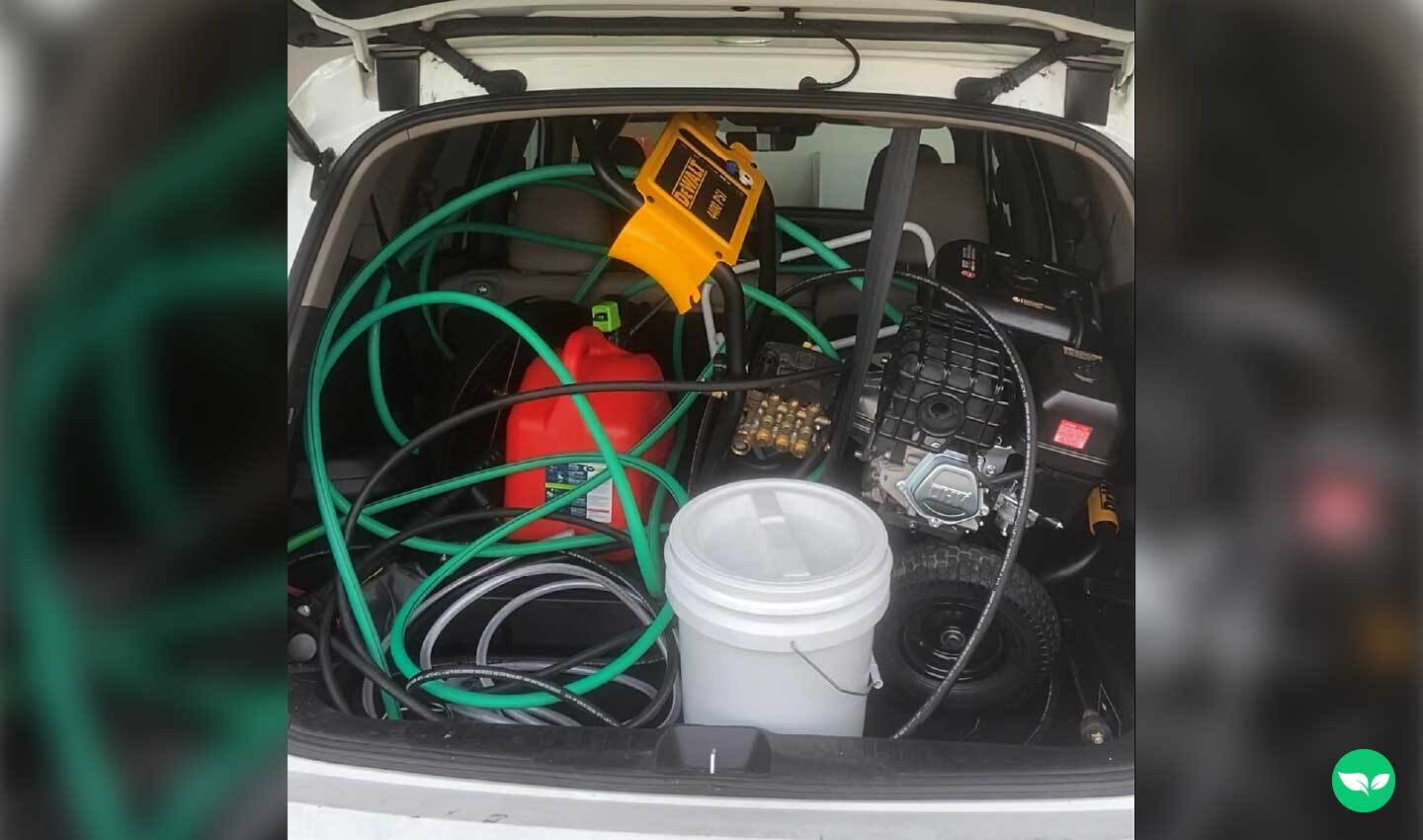
This sense of teamwork proved invaluable over the years, but so did learning to take calculated risks. Before venturing into vending machines, Zach and his brother tried their hand at e-commerce, launching a store that sold mini model guns. They poured thousands into inventory and marketing, but when sales didn’t materialize, Zach was left with stacks of unsold products. “It was an expensive lesson,” he admitted, “and I learned that copying another business model isn’t the same as creating a unique solution.”
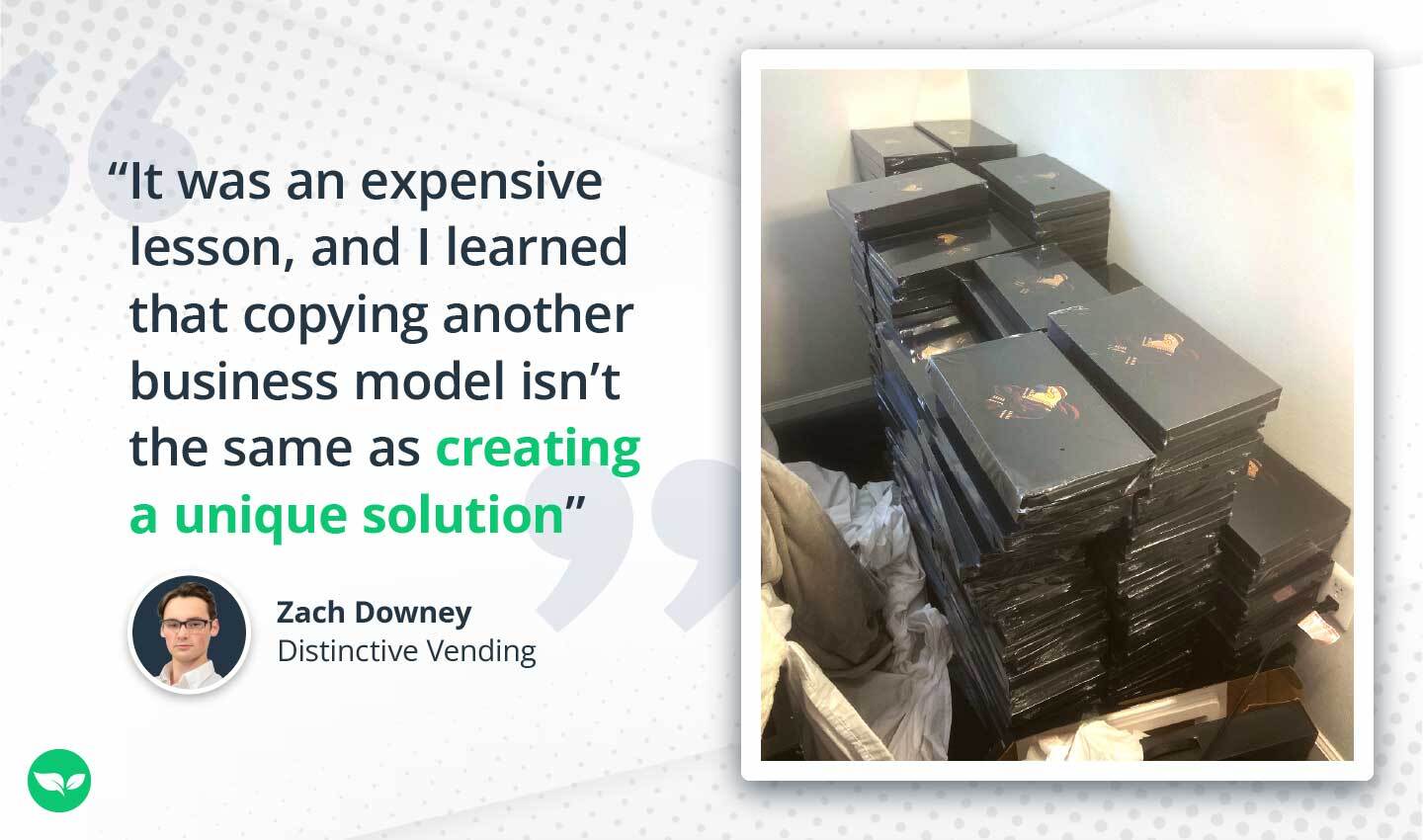
These early experiences laid the groundwork for what was to come. Armed with hard-earned lessons and a growing resilience, Zach would eventually pivot from a failed pizza vending machine idea to the cotton candy venture that would define his success.
Related: 20 Low-Cost Online Business Ideas With High Profit Potential
From Pizza to Cotton Candy Vending
While Zach’s early ventures didn’t turn out as planned, they paved the way for a bold idea during his time at James Madison University. Noticing that the campus shut down its food services by midnight, even though many students stayed up far later, Zach saw an opportunity. He pitched a pizza vending machine concept to the university’s food and beverage department, who ultimately loved the idea. The plan was set — until regulatory roadblocks halted progress. “Since JMU receives federal funding, they require UL-certified vending machines, and that didn’t exist for pizza at the time,” Zach recalled.
Despite the setback, the experience taught Zach an unexpected lesson: large institutions are often open to partnering with entrepreneurs if you can solve their problems. “Anyone can do business with big companies,” he said. “Beginners sometimes think you have to be a big player to work with the big boys, but that just isn’t true. You need two things: to solve a problem and to convey your solution properly.”
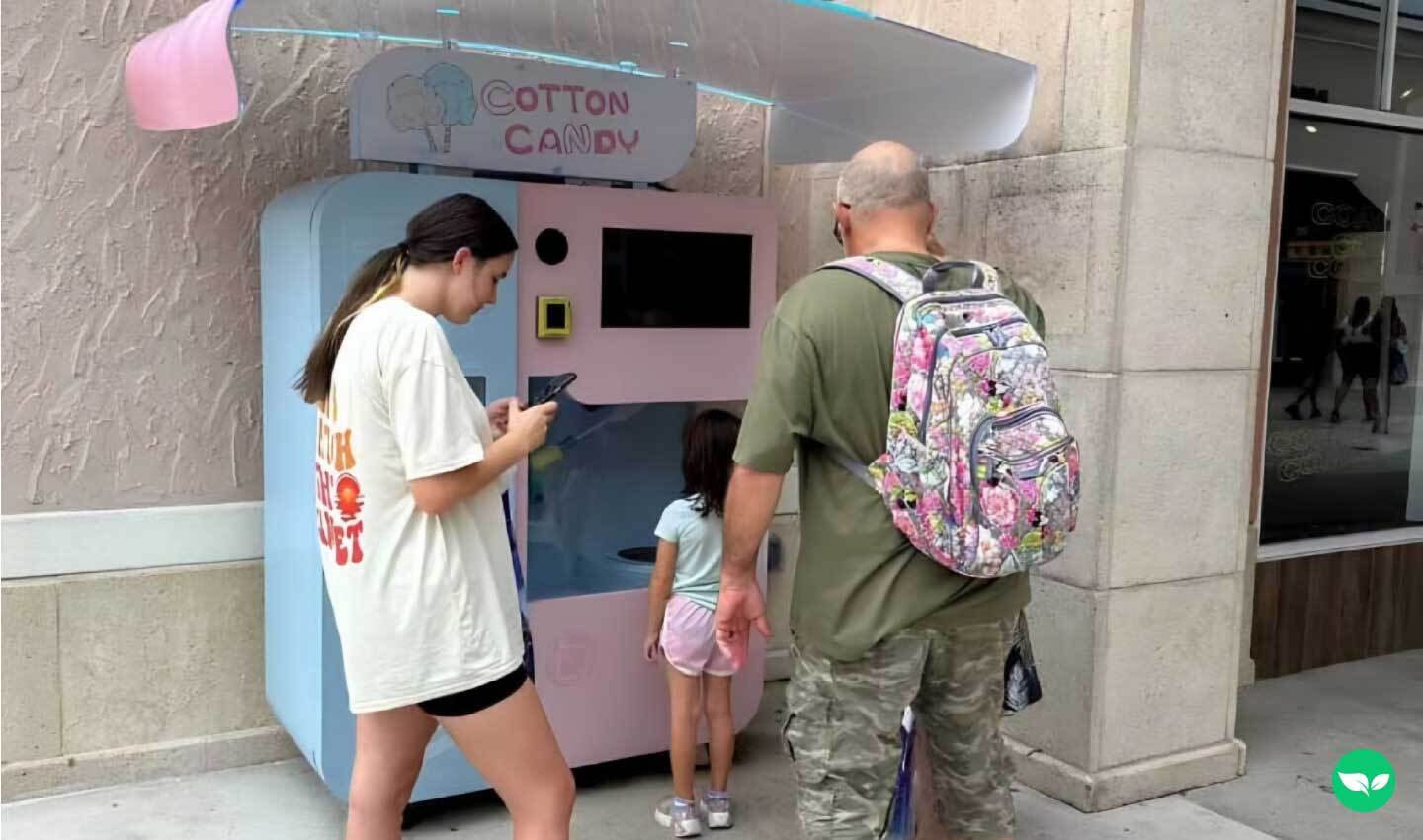
Undeterred, Zach returned to his research and stumbled upon a niche no one seemed to be exploring — cotton candy vending machines. Seeing potential in the untapped market, he shifted his focus and began reaching out to resorts and amusement parks to gauge interest. It was a pivot that would change his trajectory completely.
Troubleshooting from Afar
Launching Distinctive Vending wasn’t without its share of early obstacles. Zach’s first cotton candy machines were installed in Texas, even though he was based in Virginia — a distance that quickly complicated maintenance. “About two months after setting up our first machines, they broke down,” he said. “Each piece of cotton candy was coming out smaller and smaller until it was just the stick.” With no local support and a malfunction on his hands, Zach found himself making 24-hour drives from Virginia to Texas just to troubleshoot. “I was driving back and forth, sometimes without sleep, just to save time,” he recalled.

That initial malfunction turned out to be a costly lesson, resulting in a loss of between $2,000 to $5,000 for the project. But it taught Zach the importance of reliable maintenance solutions — especially for a semi-passive business model. As he began adding machines, he also began contracting local help for regular cleaning and minor fixes, enabling him to address problems without sacrificing time or money.
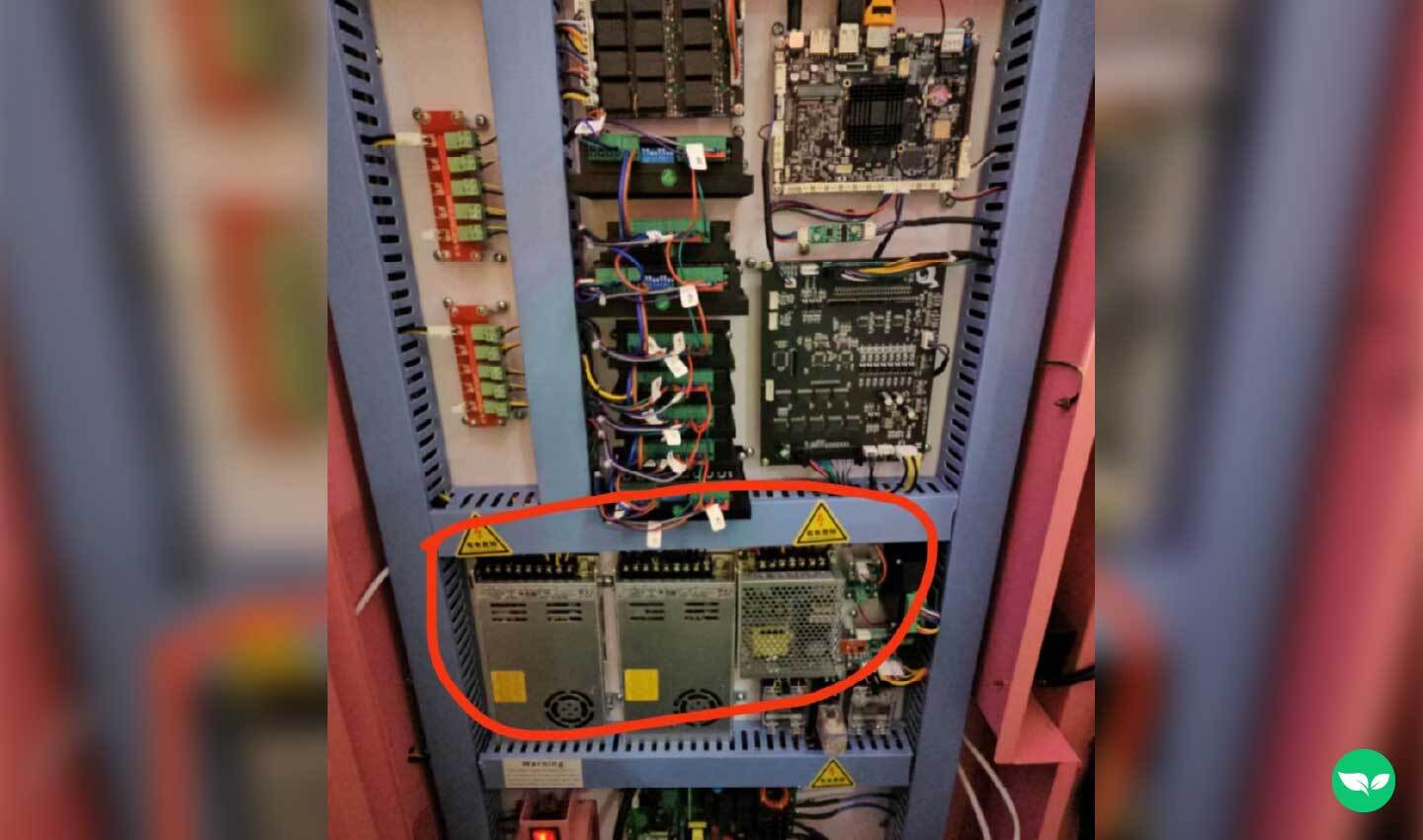
These early challenges showed Zach just how crucial it was to plan ahead and keep things running smoothly, especially as his business expanded across state lines. Each setback tested his resilience and pushed him to find smarter ways to simplify operations and prepare for the next round of machines.
The Thrill of Passive Income
After the challenges of setting up his first few machines, Zach finally got to experience the thrill of passive income. “One of the greatest feelings I’ve had from this business was seeing revenue for the first time,” he shared. While on a flight back from Texas after installing his first machine, Zach checked the sales report once he landed. “I loaded up the page, not really expecting to see anything,” he recalled. “But there it was — a huge blue bar that showed we made like $80 or something.”
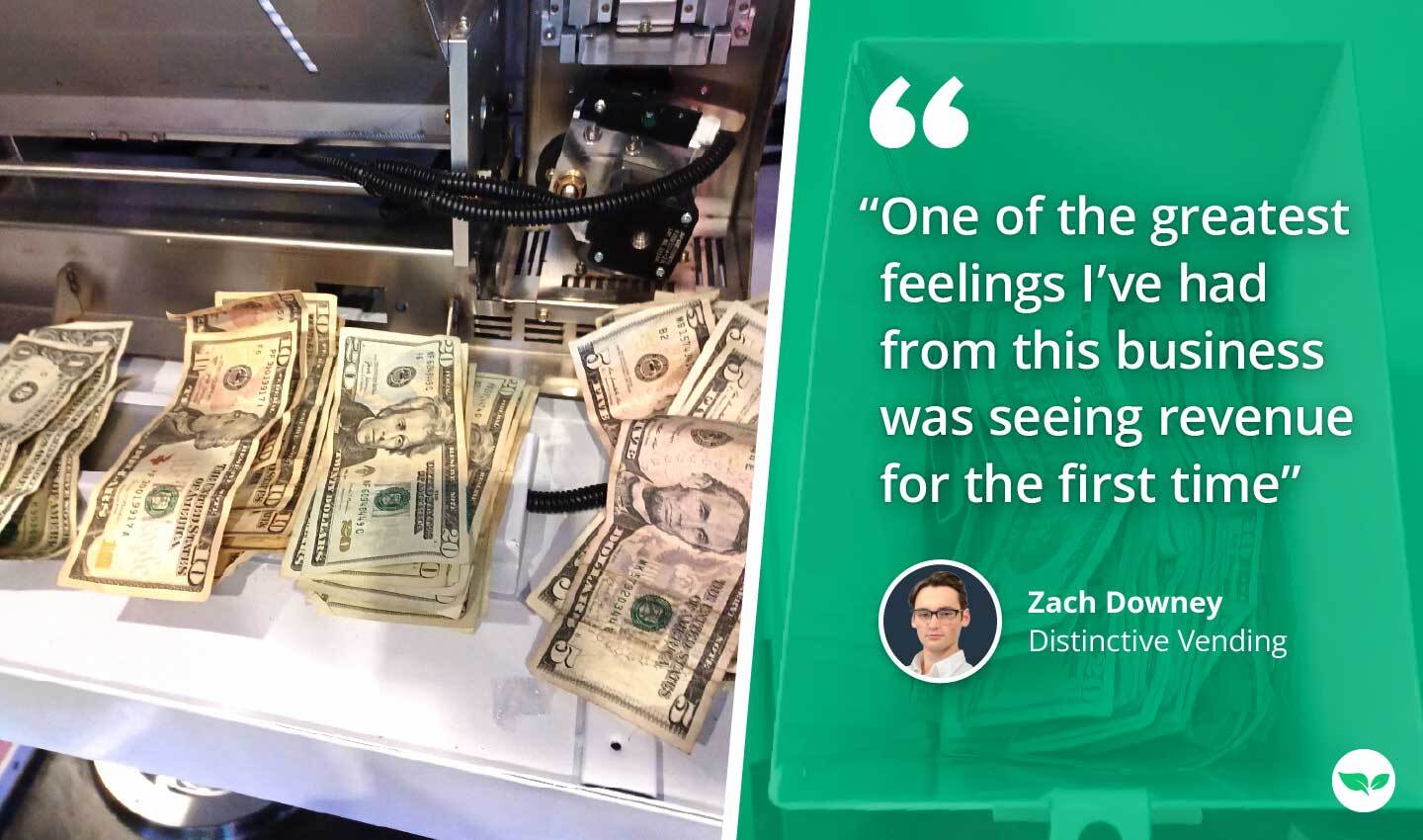
That first $80 was a small amount compared to what his business would eventually bring in, but for Zach, it marked a defining moment. “There have been days we’ve done thousands in sales, and the feeling from that still pales in comparison to that first $80 day,” he said. “I sometimes joke with friends that the rest of my life, I’ll be chasing that feeling.”
Since then, his vending machines have reached new heights, sometimes bringing in thousands of dollars in a single day. This initial taste of success fueled his drive to expand Distinctive Vending, proving that even a small win can inspire big ambitions.
Related: 16 Practical Ways to Make $1,000 Fast
Reaching $500K and Beyond
With the early successes of his cotton candy vending machines, Zach set his sights on expansion. Distinctive Vending is currently on track to generate $500,000 in revenue this year, but he has even bigger goals for the future. “This year we’re on track to do about $500,000, and next year I think we’ll reach well into the seven figures,” he shared. For a business built on vending machines, scaling means adding more machines — an investment-intensive strategy that requires careful planning and capital.
To streamline this growth, Zach has focused on high-traffic areas in Florida and California, regions known for their amusement parks and dense visitor foot traffic. “The amusement park industry is highly concentrated in two states: Florida and California, which represents the bulk of our business,” he explained. This targeted approach allows him to maximize return on investment and reduce logistical complications by clustering machines within high-density areas.
Additionally, Zach has found success with a targeted, low-cost marketing strategy. Rather than investing in ads, he relies on email outreach to build partnerships with amusement parks and other high-traffic venues. “Every single client has come to us through email marketing,” he noted, highlighting his ability to grow his client base without spending on traditional advertising.
Through a combination of strategic location selection and focused outreach, Zach is now laying the groundwork for an even larger vending machine network — a vision that could soon see Distinctive Vending become a million-dollar-a-year business.
Choosing the Right Locations
As Zach scaled Distinctive Vending, he learned that choosing the right location was everything. High-traffic venues, like amusement parks, offered the best return on investment, and each new machine required careful consideration. “Finding locations is the easy part,” Zach explained. “I don’t think there are any amusement parks out there that wouldn’t be profitable for us to service. Right now, we’re just trying to focus on the highest return on investment per location.”
Beyond choosing the right venue, however, Zach knew he had to secure buy-in from decision-makers. His approach to pitching his cotton candy vending machines was strategic and highly personalized. To connect with the right people, Zach would research each organization’s structure and reach out to key roles, such as managers of retail or sourcing, often through LinkedIn.
For top-level contacts, he relied on custom-tailored emails to capture their attention. “For higher-level executives, we suggest highly personalized emails,” he shared. In his emails, Zach typically positioned the vending machines as a way to enhance the guest experience while providing an additional revenue stream for the park. His formula — targeted outreach combined with a clear value proposition — proved to be an effective strategy for landing prime locations.
This two-part process, of finding high-traffic venues and pitching them strategically, became a core pillar of Zach’s expansion approach, allowing him to grow Distinctive Vending without compromising profitability.
Key Advice for Aspiring Vending Entrepreneurs
For those interested in breaking into the vending business, Zach offers practical advice based on his own experiences — both the successes and the lessons he learned the hard way. Here are his top recommendations for anyone thinking about building a profitable vending machine business:
Start with a Niche Product: Choosing a unique, less conventional product can set you apart from traditional vending options. “Cotton candy vending machines were an untapped niche that set us apart from the usual snack and drink machines,” Zach explained. If he could start over, he’d still choose an unconventional product but would focus even more on finding something simple to maintain. For new entrepreneurs, he recommends exploring niche options with less competition, making your machines more appealing to venue owners and customers alike.
- Location is Critical: In the vending business, placement is everything. High-traffic areas like amusement parks and resorts provide the best returns, but not all high-traffic spots are equal. “Sometimes, we’ll test a machine in a location and realize it’s not as profitable as expected,” Zach shared. He advises scouting locations that naturally draw large crowds and, if possible, negotiating trial periods to see if the site’s traffic translates into steady revenue.
- Build Relationships with Key Decision-Makers: Getting your machines into prime locations often depends on connecting with the right people. Zach recommends that new vending entrepreneurs take the time to build relationships with venue managers and decision-makers. “For higher-level executives, a personalized email can make all the difference,” he noted. By spending extra time crafting thoughtful outreach, you not only increase your chances of landing a spot but also build a solid network that can open doors to new opportunities.
- Plan for Semi-Passive Operations: While vending can be lucrative, it isn’t always the fully passive income stream that people envision. “When we started, I didn’t realize just how much time would go into maintenance,” Zach admitted. He suggests focusing on logistics from the start: clustering machines in nearby locations, hiring contractors for routine maintenance, and implementing efficient cleaning schedules. These steps can help make the business as passive as possible without sacrificing quality or customer satisfaction.
- Scale Wisely with Focused Expansion: Instead of spreading machines across multiple states, Zach emphasizes concentrating machines in key regions. “If I could go back, I’d avoid installing machines too far from each other — it saves so much on logistics,” he said. By focusing on high-density areas, you can reduce costs, simplify contractor management, and create a more sustainable business model.
- Low-Cost Marketing and Outreach: Traditional advertising isn’t necessary for most vending businesses, Zach discovered. “Every single client has come to us through email marketing,” he shared. If he were starting over, he’d skip paid ads altogether and focus even more on targeted, low-cost email outreach. For niche vending businesses, he suggests personalizing outreach to a small number of target clients and building connections instead of pouring money into ads.
These strategies have helped Zach build Distinctive Vending into a profitable, growing enterprise. His final piece of advice? “Don’t get too stuck on the planning stage. Try something, test it, and then adjust,” he said.
Related: How We Made $347,000 Blogging in Just 2 Months
Moving Forward with Distinctive Vending
Zach Downey’s journey with Distinctive Vending shows what can happen when you spot an opportunity and go all-in, even if the path is anything but straightforward. From his days of trying to make money in college pitching pizza machines to scaling a cotton candy vending business, Zach’s story is a mix of persistence, smart pivots, and finding a way through every challenge.
Looking ahead, Zach plans to expand Distinctive Vending by adding 25 to 50 more machines in high-traffic areas across Florida and California, aiming to hit seven figures in revenue next year. He’s still perfecting his model and figuring out the best locations to reach that goal. But if his past is any indication, he’s not afraid to test new ideas, make adjustments, and keep growing.
Related:

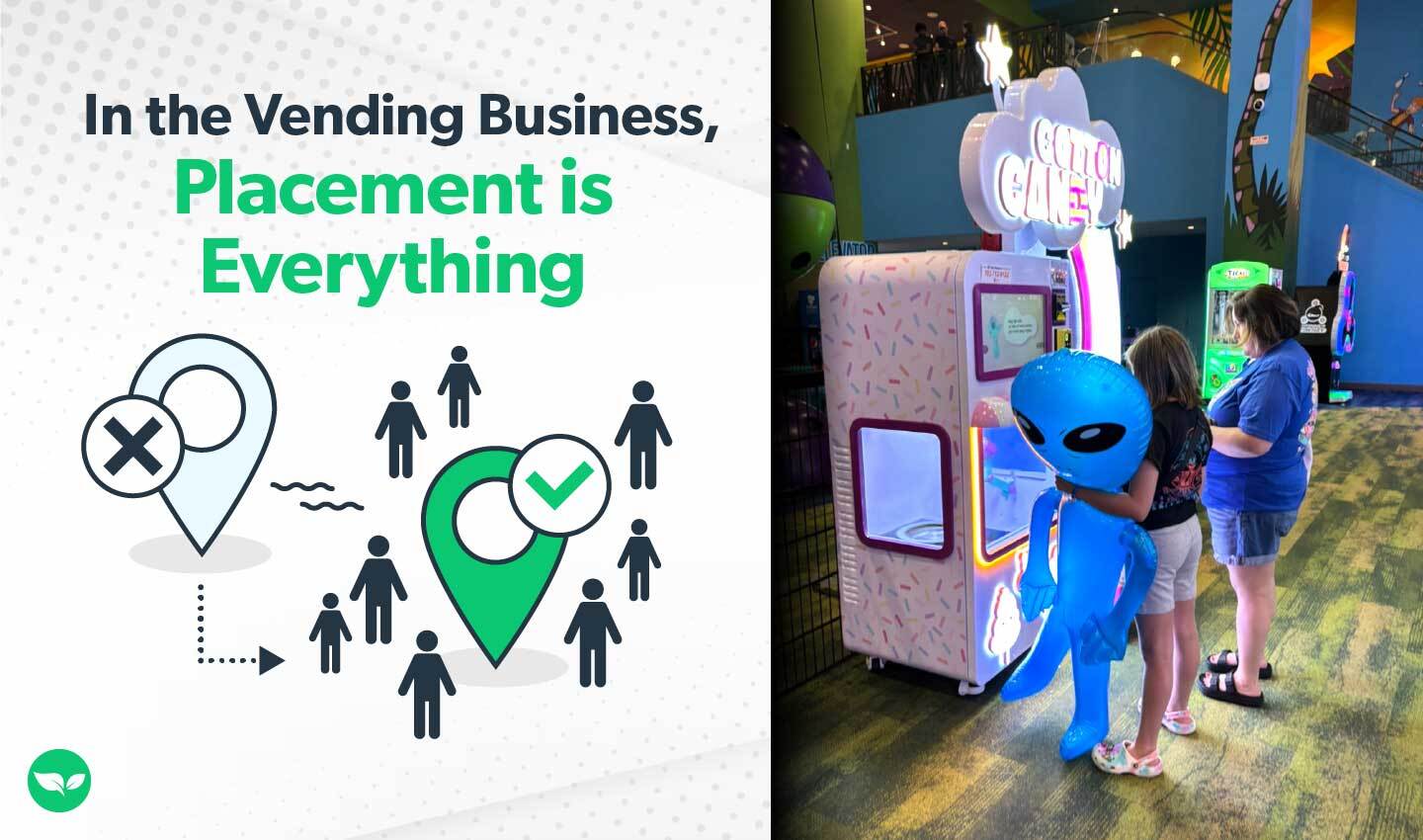
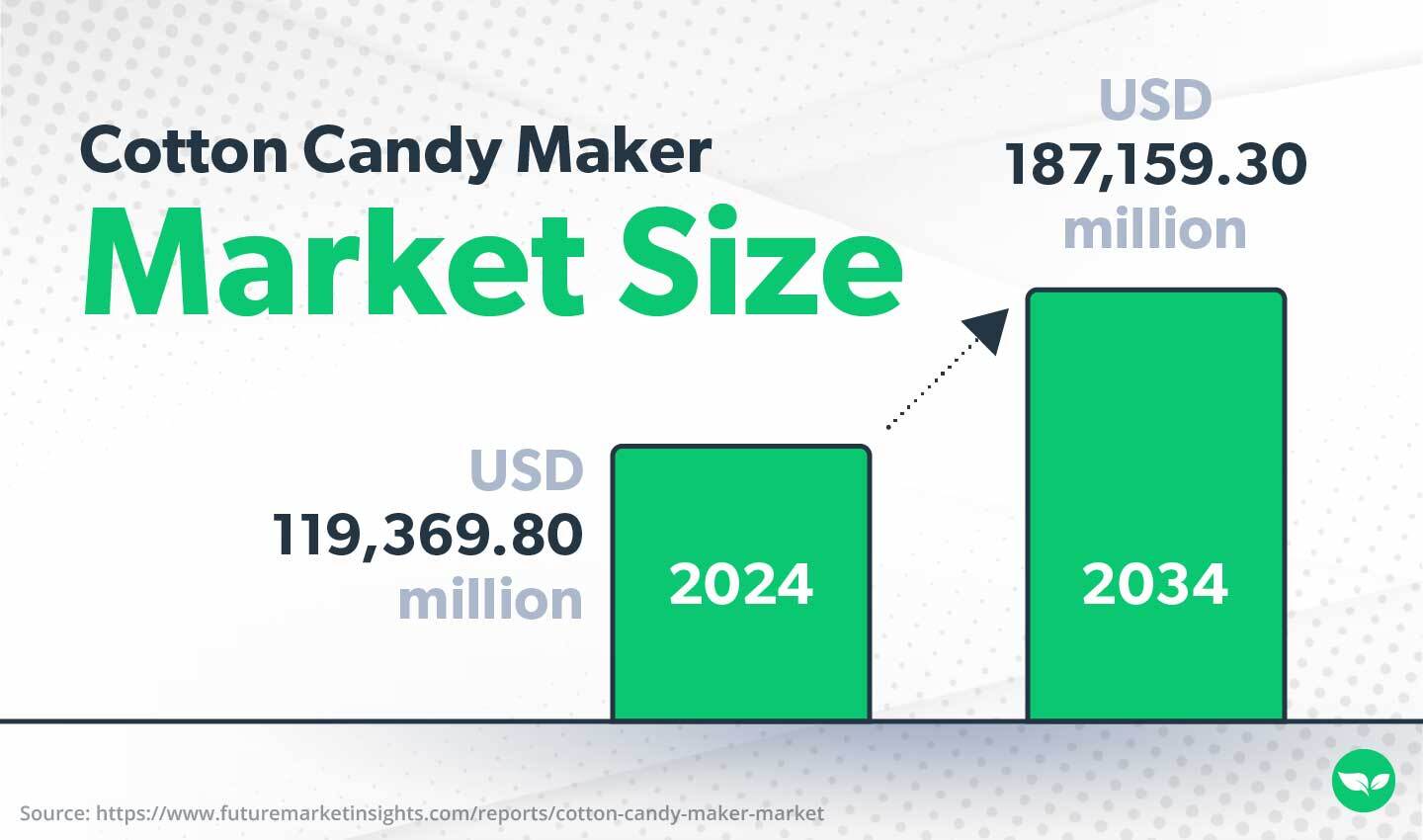
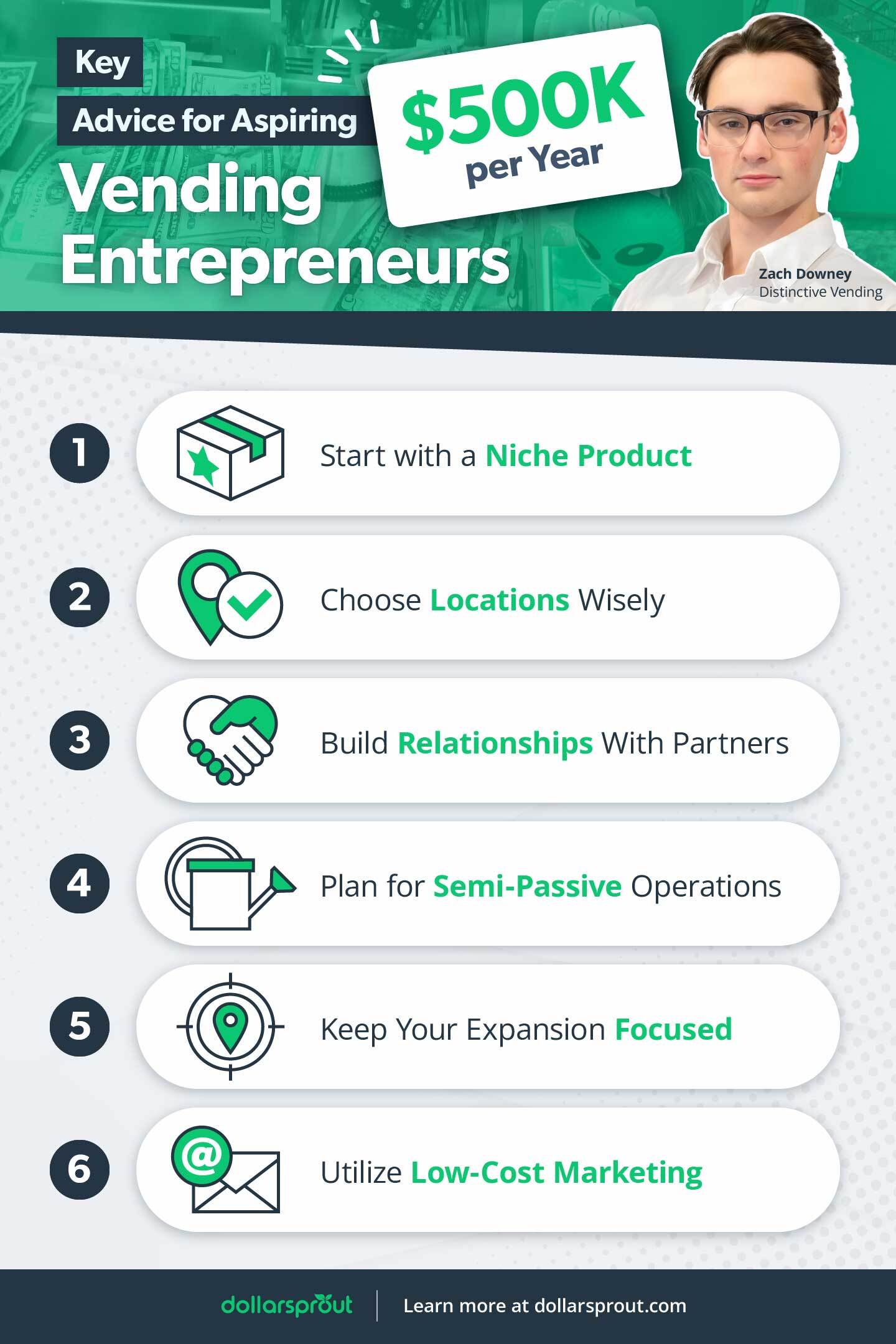 Start with a Niche Product: Choosing a unique, less conventional product can set you apart from traditional vending options. “Cotton candy vending machines were an untapped niche that set us apart from the usual snack and drink machines,” Zach explained. If he could start over, he’d still choose an unconventional product but would focus even more on finding something simple to maintain. For new entrepreneurs, he recommends exploring niche options with less competition, making your machines more appealing to venue owners and customers alike.
Start with a Niche Product: Choosing a unique, less conventional product can set you apart from traditional vending options. “Cotton candy vending machines were an untapped niche that set us apart from the usual snack and drink machines,” Zach explained. If he could start over, he’d still choose an unconventional product but would focus even more on finding something simple to maintain. For new entrepreneurs, he recommends exploring niche options with less competition, making your machines more appealing to venue owners and customers alike.